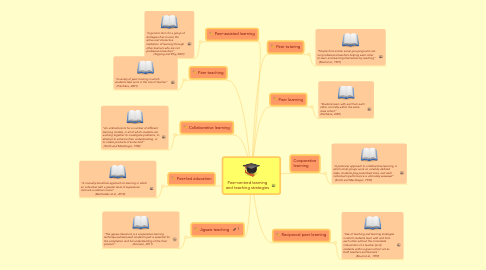Peer-centred learning and teaching strategies
作者:Fionnuala Power

1. Peer teaching
1.1. "A variety of peer tutoring in which students take turns in the role of teacher" (Falchikov, 2001)
2. Peer-assisted learning
2.1. "A generic term for a group of strategies that involve the active and interactive mediation of learning through other learners who are not professional teachers" (Topping and Ehly, 2001)
3. Collaborative learning
3.1. "An umbrella term for a number of different learning models, in all of which students are working together to investigate problems, to attempt to enhance their understanding, or to create products of some kind" (Smith and MacGregor, 1992)
4. Jigsaw teaching
4.1. "The jigsaw classroom is a cooperative learning technique [where] each student's part is essential for the completion and full understanding of the final product" (Aronson, 2011)
5. Peer-led education
5.1. "A mutually beneficial approach to learning in which an individual with a greater level of experience instructs a relative novice" (Batchelder et al., 2010)
6. Peer learning
6.1. "Students learn with and from each other, normally within the same class cohort" (Falchikov, 2001)
7. Peer tutoring
7.1. "People from similar social groupings who are not professional teachers helping each other to learn and learning themselves by teaching" (Reid et al., 1997)
8. Cooperative learning
8.1. "A particular approach to collaborative learning, in which small groups work on carefully defined tasks, students play prescribed roles, and each individual's performance is ultimately assessed" (Smith and MacGregor, 1992)
9. Reciprocal peer learning
9.1. "Use of teaching and learning strategies in which students learn with and from each other without the immediate intervention of a teacher [and] students within a given cohort act as both teachers and learners" (Boud et al., 1999)


